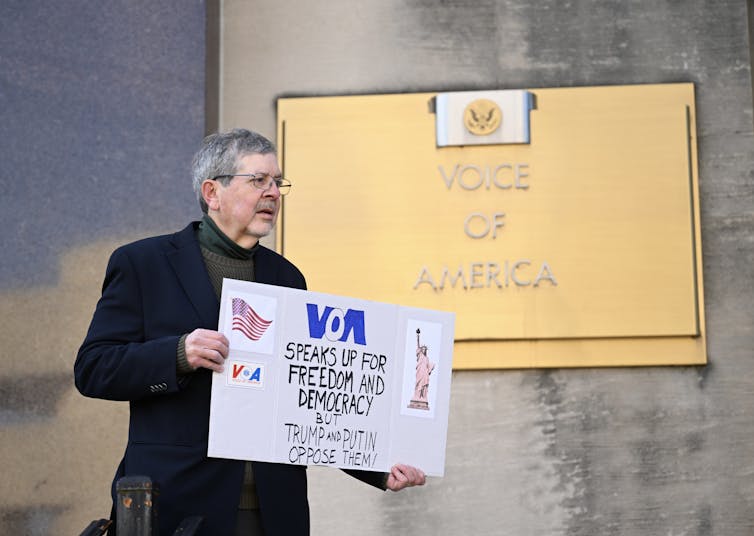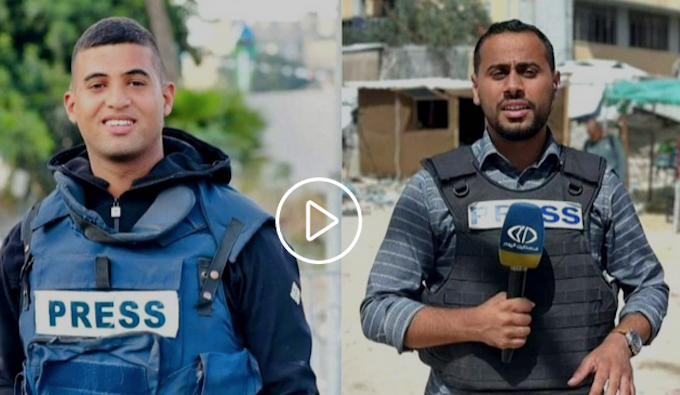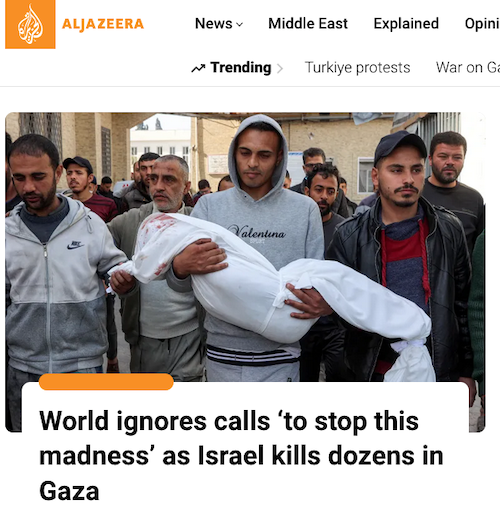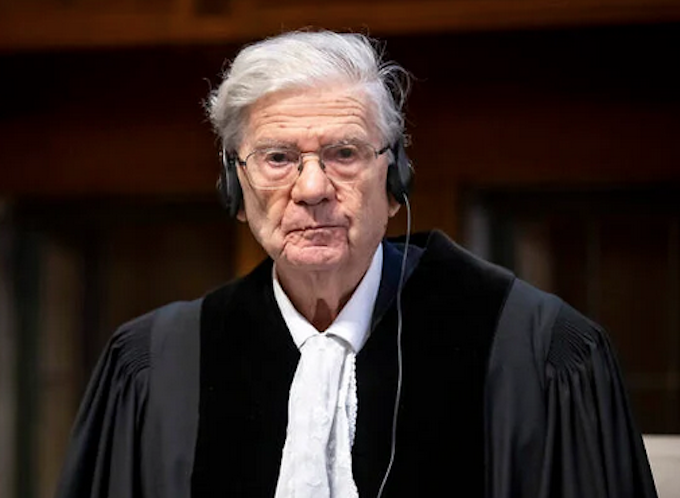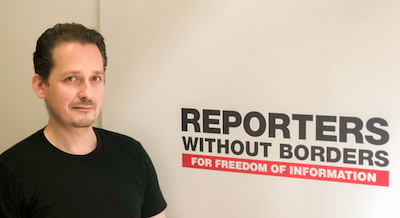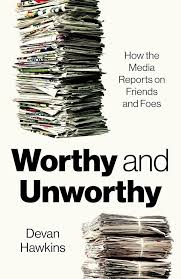The BBC’s withdrawal of the powerful documentary, ‘Gaza: How to Survive a Warzone’, epitomises how much the UK’s national broadcaster is beholden to the Israel lobby.
The corporation’s longstanding systematic protection of Israel, considered an ‘apartheid regime’ by major human rights organisations, has been particularly glaring since the country launched its genocidal attacks on Gaza in October 2023. We have all seen the repetition and amplification of the Israeli narrative above the Palestinian perspective, omission of ‘Israel’ from headlines about its latest war crimes committed in Gaza, and even the dismissive treatment by senior BBC management of serious concerns about bias raised by their own journalists.
The documentary focused on the experiences of several children trying to survive in Gaza under brutal attack by Israeli forces armed to the hilt with weaponry and intelligence from the US, the UK and other western nations. It transpired that the film’s narrator, 13-year-old Abdullah al-Yazuri, is the son of Ayman al-Yazuri, a deputy minister of agriculture in Gaza’s government which is administered by Hamas.
Mr al-Yazuri previously worked for the United Arab Emirates’ education ministry and studied at British universities, obtaining a PhD in chemistry from the University of Huddersfield. Middle East Eye (MEE), an independently-funded online news organisation covering stories from the Middle East and North Africa, described him as ‘a technocrat with a scientific rather than political background’, pointing out that ministers, bureaucrats and civil servants in Gaza are appointed by Hamas.
Indeed, as MEE explained:
‘Many Palestinians in Gaza have family or other connections to Hamas, which runs the government. This means that anyone working in an official capacity must also work with Hamas.’
A campaign was launched by pro-Israel voices, including Tzipi Hotovely, Israel’s ambassador to the UK, and Danny Cohen, a former director of BBC television, to pressure the BBC to drop the documentary from iPlayer, soon after it was broadcast on BBC Two on 17 February.
Despite a countercampaign by over 1,000 media and film professionals objecting to the ‘racist’ and ‘dehumanising’ targeting of the documentary by supporters of Israel, the BBC quickly caved in, apologising for ‘mistakes’ that they deemed ‘significant and damaging’. Notably, however, the BBC did not point to any errors or inaccuracies in the actual editorial content of the programme.
The broadcaster attempted to divert some of the blame onto the independent company, Hoyo Films, who had made the documentary, saying that the BBC had not been told by the filmmakers that Abdullah al-Yazuri’s father was a deputy agriculture minister in the Hamas government.
Hoyo Films told the BBC it paid the boy’s mother ‘a limited sum of money for the narration’ via his sister’s bank account. A BBC spokesperson said:
‘While Hoyo Films have assured us that no payments were made to members of Hamas or its affiliates, either directly, in kind, or as a gift, the BBC is seeking additional assurance around the budget of the programme and will undertake a full audit of expenditure.’
Addressing MPs from the House of Commons Culture, Media and Sport Committee on 3 March, Samir Shah, the BBC’s chairman, said that:
‘This is a really, really bad moment. What has been revealed is a dagger to the heart of the BBC’s claim to be impartial and to be trustworthy, which is why I and the board are determined to ask the questions.’
Tim Davie, the BBC’s director general, told the MPs that after ‘failures in transparency’ he simply ‘lost trust’ in the production of the film and personally ordered it to be withdrawn:
‘It was a very difficult decision. What I did – and it was a very tough decision – was to say, at the moment, looking people in the eye, can we trust this film in terms of how it was made, the information we’ve got? And that’s where we made the decision. It’s a simple decision in that regard.’
In short, one child’s family connection with an official in the civilian administration of Gaza is supposedly reason enough to remove a vital documentary humanising Palestinians. This is an important film which redressed, to a marginal extent, the overwhelming pro-Israel bias displayed by the BBC over the past 18 months.
Meanwhile, the broadcaster repeatedly and prominently platforms the leaders and spokespeople of a state committing genocide and apartheid. Is it any wonder the public reputation of BBC News has likely nosedived yet further since 7 October, 2023?
As Mark Seddon, director of the Centre for UN Studies at the University of Buckingham and a former speechwriter for UN Secretary-General Ban Ki-moon, observed via X:
‘Tim Davie should perhaps get the BBC to do some sampling. He may discover that there is a significant body of public opinion that has [been], and is, losing faith in BBC news gathering which is increasingly parochial & transparently failing when it comes to Israel/Palestine.’
Although Davie insisted on the need for BBC ‘transparency’, he was not at all transparent when asked by Rupa Huq MP to name specific groups or individuals who had demanded the BBC withdraw the film. He declined to do so. One of those is, as mentioned, the Israeli ambassador to the UK who constantly repeats ludicrous propaganda such as ‘our only target is Hamas facilities’, and who has denied that there is any humanitarian crisis in Gaza.
Spineless BBC
As Chris Doyle, the director of the Council for Arab-British Understanding, noted:
‘By pulling [the] Gaza film, BBC shows it cannot stand up to Israel.’
By contrast, he pointed out that in 2003, the BBC aired a documentary on Israel’s nuclear programme, titled Israel’s Secret Weapon:
‘Israeli leaders hit the roof and banned its officials from appearing on the BBC.
‘The documentary was spot on. Israel was embarrassed at having its nuclear arsenal exposed when Iraq was being invaded for a non-existent stash of weapons of mass destruction.’
Doyle added:
‘The BBC did not cave in, and Israel lifted its boycott.
‘Twenty-five years later, the BBC has lost any semblance of a spine on Israel.’
British-Israeli historian Avi Shlaim, an emeritus professor of international relations at Oxford, said that the pulling of the film was ‘only the latest example of the public broadcaster’s regular capitulation to pressure from the pro-Israel lobby’. He continued:
‘The BBC has good reporters on Israel-Palestine, but its bosses are hopelessly compromised by their pronounced and persistent bias in favour of Israel.
‘The reason for this bias is not lack of knowledge but cowardice, the fear of antagonising Israel and Israel’s friends in high places in Britain.’
Richard Sanders, an award-winning producer who has made over fifty films in history, news and current affairs, including Al-Jazeera’s ‘October 7’ documentary, said:
‘Had the situation been reversed and an Israeli boy revealed to be the child of a junior minister in Netanyahu’s government the BBC might have felt obliged to issue one of its “corrections and clarifications” but it’s highly unlikely the film would have been withdrawn and the – extremely vulnerable – production team humiliated in such a public manner.’
Sangita Myska, dropped by radio broadcaster LBC in April 2024 after robustly challenging an Israeli spokesman live on air, wrote on X:
‘I was a BBC journalist for years. However well-intentioned the Gaza doco-makers were, they did not meet editorial standards of transparency BUT does that make a material difference to the overall accuracy of the film? Given the weight of supporting evidence: Probably not.’
She added:
‘I’m reliably informed that morale amongst some brilliant, committed, journalists is in free-fall over this.’
Sanders followed up with:
‘As another old hand who has spent more hours in sweaty edit suites with lawyers and commissioning editors than I care to remember I broadly agree with @SangitaMyska’s comments.
‘But I’d stress that a media environment where the victims of genocide, ethnic cleansing and apartheid are subjected constantly to the most intense scrutiny, while their tormentors and those who support them are all too often allowed a free pass is a distorted and frankly racist one.’
He added:
‘Gaza: How to Survive a Warzone remains by far the best thing the BBC has produced on Gaza and bore no evidence at all of any Hamas involvement in its editorial content.
‘It is deeply concerning that it is now being used as a stick to beat the BBC which must not allow itself to become even more cowed.’
In October 2024, the BBC had broadcast a documentary called, ‘Surviving October 7th: We Will Dance Again’. The BBC’s description said:
‘A harrowing glimpse into the brutal assault on partygoers at the Nova Music Festival – one of the sites in Israel attacked by Hamas on 7 October 2023.’
As one user on X pointed out last week:
‘BBC made a documentary “We Will Dance Again”
‘Was there anyone in that documentary that was IDF or related to IDF?
‘Were there any serving soldiers or illegal settlers in the documentary.
‘Were any of their children in it?
‘As a @BBC licence payer, I demand an inquiry.’
Of course, the ‘demand’ for an inquiry was intended ironically and there was no response from the BBC. But the point was clearly made.
The Truth Exists
As mentioned in several of our previous alerts on Israel and Palestine, there is tremendous pressure on journalists working at BBC News to toe the Israeli line. Notably, since 7 October, use of the word ‘genocide’ has essentially been banned. Any time an interviewee mentions the word in a live setting, the BBC presenter intervenes to shut down the discussion. As one anonymous former BBC journalist said:
‘People [at the BBC] were terrified of using the word “genocide” in coverage. They still are. You will very rarely see it in any BBC coverage. And if an interviewee says the word “genocide”, the presenter will almost always panic.’
And whenever Israeli war crimes or breaches of international law are raised by a guest on a BBC television or radio programme, the BBC journalist will promptly add words to the effect that, ‘Israel denies that’ or ‘Israeli disputes that’. Such BBC repetition of one side’s viewpoint is rarely, if ever, seen when reporting or discussing Russia’s actions in Ukraine, for example, or more generally when addressing Moscow’s role in global affairs.
Karishma Patel, a former BBC researcher, newsreader and journalist, wrote recently about her reasons for leaving the BBC. She observed ‘a shocking level of editorial inconsistency’ in how the BBC covers Gaza. Journalists were ‘actively choosing not to follow evidence’ of Israeli war crimes ‘out of fear’.
Media Lens readers may recall the late Professor Greg Philo, head of the Glasgow Media Group, relating how he was once told by senior BBC editors that they ‘wait in fear’ for a phone call from the Israeli embassy in London whenever a news item appears on Israel or Palestine.
Patel continued:
‘Impartiality has failed if its key method is to constantly balance “both sides” of a story as equally true. A news outlet that refuses to come to conclusions becomes a vehicle in informational warfare, where bad faith actors flood social media with unfounded claims, creating a post-truth “fog”. Only robust evidence-based conclusions can cut through this.’
She described her horror at seeing images for the first time of a Palestinian man crushed to death by an Israeli bulldozer, adding:
‘To see such overwhelming evidence every day and then hear 50/50 debates on Israel’s conduct – this is what created the biggest rift between my commitment to truth and the role I had to play as a BBC journalist. We have passed the point at which Israel’s war crimes and crimes against humanity are debatable. There’s more than enough evidence – from Palestinians on the ground, aid organisations; legal bodies – to come to coverage-shaping conclusions around what Israel has done.’
As she rightly noted, ‘truth exists’ based on reasonable, verifiable evidence:
‘In a world where claims are constantly competing, a journalist’s job is back-breaking: it is to investigate and come to conclusions, rather than setting up constant debates – no matter who this angers and no matter how much work it takes.’
A perfect example is the fake ‘debate’ over the reality of human-induced climate change. Until very recently, the BBC created a spurious ‘balance’, where none exists, hosting exchanges between highly-credentialed climate scientists and climate ‘sceptics’ often linked to fossil fuel interests.
Patel observed:
‘In 2018, the BBC issued long overdue editorial guidance to its staff, stating: “Climate change IS happening.” There was a sigh of relief from climate scientists, after years spent warning the organisation its debates were harmful. Coverage would now be rooted in this evidence-based conclusion.’
She summed up:
‘When will the BBC conclude that Israel IS violating international law, and shape its coverage around that truth? As the old saying goes, the journalist’s job isn’t to report that it may or may not be raining. It’s to look outside and tell the public if it is. And let me tell you: there’s a storm.’
The withdrawal of the Gaza documentary has been followed by ‘torrents of online harassment and abuse targeting 13-year-old Abdullah and his family’, according to MEE. Abdullah said:
‘I’ve been working for over nine months on this documentary for it to just get wiped and deleted… it was very sad to me.’
Abdullah told MEE that the whole affair has caused him serious ‘mental pressure’ and made him fear for his safety.
A BBC spokesperson claimed:
‘The BBC takes its duty of care responsibilities very seriously, particularly when working with children, and has frameworks in place to support these obligations.’
Richard Sanders pointed out that ‘more than 200 journalists have been killed by the Israelis in Gaza’. He said that it was dangerous that:
‘the team that made this [film] are effectively being smeared as Hamas accomplices. And at the heart of the story we have a vulnerable child.’
In an interview with the Sunday National newspaper in Scotland, Patel said:
‘He [Tim Davie] was talking about distrusting the entire film on the basis of this connection that the child narrator has.
‘One of the things that occurred to me is the fact that the BBC over the past 15 or 16 months has on two different occasions willingly chosen to embed with the Israeli military and to be openly subject to its censor. That was Al-Shifa Hospital in Gaza quite early on and there was a Lebanese town as well, where a BBC correspondent followed the Israeli military into the town.
‘There is a lot of concern around potential influence over this documentary but there was very little public concern over our public broadcaster embedding with the Israeli military.’
In a message he addressed to the BBC, Abdullah said:
‘I did not agree to the risk of me being targeted in any way before the documentary was broadcasted on the BBC. So [if] anything happens to me, the BBC is responsible for it.’
Artists for Palestine UK, who organised the letter mentioned earlier with over 1,000 signatories demanding reinstatement of the film, warned that:
‘Tim Davie and Samir Shah are throwing Palestinian children under the bus.
‘BBC bosses must explain how they plan to safeguard the children who participated in the film. Their lives are in danger as Israel cuts off aid and threatens to collapse the ceasefire in Gaza. How will Britain’s public broadcaster ensure it isn’t putting a target on innocent kids’ backs?’
Abdullah finished by telling MEE that he is grateful to ‘all of those in the United Kingdom who had supported me, supported the documentary and had protested for the documentary to be put back on the BBC. I thank you all from the bottom of my heart, and continue your efforts that hopefully can and will return the movie back up on BBC. I hope that Gaza sees light again, that children of Gaza have a bright future again and everybody… sees a better future and a better tomorrow.’
He concluded by saying: ‘My wish is to study journalism [in] the United Kingdom.’
If Abdullah achieves his dream, it seems unlikely he will pursue a career in journalism with the BBC.
DC
Note. At the time of writing, ‘Gaza: How to Survive a War Zone’, can be viewed here on Rumble.
The post
BBC Credibility Nosedives Even Further first appeared on
Dissident Voice.
This post was originally published on Dissident Voice.
